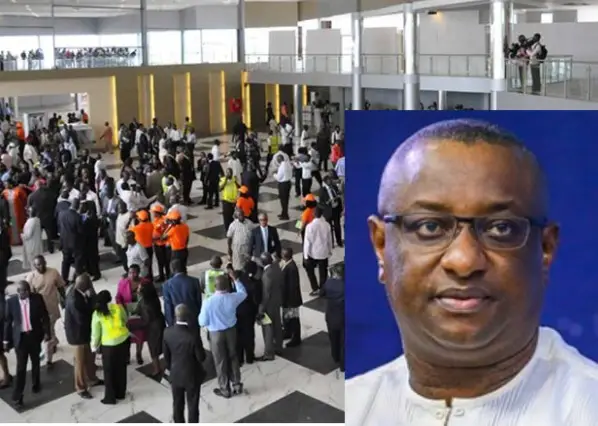
•Most airports in Nigeria are still sunset – Okonkwo
Indications have emerged that the effectiveness of the compensation scheme for passengers proposed by the Minister of Aviation and Aerospace Development, Festus Keyamo, may be in doubt.
This concern arises in light of the widespread absence of the Instrumental Landing System, ILS, in numerous airports across the country, rendering it impracticable to conduct flights beyond 6pm in adverse weather conditions.
These are among the problems that hamper the operations of airlines which are beyond them. Some of the problems that cause flight delays emanate from facilities lacking in our airports and bad weather which is beyond the control of the airlines.
Saturday Vanguard gathered that the ILS, a critical precision radio navigation system facilitating aircraft guidance during nighttime or inclement weather, is notably lacking in most airports in the country.
Stakeholders have disclosed that airlines bear only a three per cent responsibility for flight delays and cancellations nationwide, attributing the remaining 97 per cent to operational challenges beyond the airlines’ control.
It would be recalled that Keyamo had revealed plans to upgrade facilities at five international airports, raising questions about the neglect of the other 16 airports under the management of the Federal Airport Authority of Nigeria, FAAN.
With Nigeria boasting 32 airports, 26 of which are operated by FAAN, and only five functioning as international airports, concerns persist over the limitations posed by the absence of ILS and other essential infrastructure, restricting airport operations to daylight hours.
Keyamo during his appearance before the Joint National Assembly Committee on Aviation to defend his ministry’s budget for the 2024 fiscal year, disclosed that a weekly list of airlines responsible for delayed or cancelled flights would be published in the media as part of the compensation scheme.
He stated that there is a need for transparency in reporting, detailing actions taken by regulators against non-compliant airlines and ensuring compensation for affected passengers.
The proposed measures include publishing reports on delays, compensations, and regulatory actions to hold airlines accountable.
Keyamo also outlined provisions for passengers, including rebates of 50 or 40 per cent when purchasing subsequent tickets in cases where compensation cannot be provided in cash.
Most airports in Nigeria are still sunset —Okonkwo
The Chairman of United Nigeria Airlines, Obiora Okonkwo, has said that these are among the reasons for flight delays and cancellations.
He stated that most passengers are not well informed on the major factors responsible for flight cancellations and delays across the country.
He said: “Last week, our scheduled departure from Anambra airport faced an unexpected challenge. Although our aircraft was ready, we could not fly to another airport due to the approaching sunset, as complying with the Nigeria Civil Aviation Authority, NCAA rule is crucial.
“After taking off from Abuja and landing in Owerri, we found ourselves just two minutes past sunset, preventing us from leaving the airport. Consequently, our aircraft remained grounded, and we had to accommodate 50 passengers in a hotel, all transpiring around 6:20 pm local time.
“The aircraft, intended for subsequent international flights to destinations like Enugu and Abuja, remained inactive. The situation led to cancellations across the board, leaving passengers frustrated and unaware of the underlying issues.
“In a related incident with our sister company bound for Osubi airport, weather challenges during the approach forced a diversion to Enugu as the alternate airport. While refuelling in Enugu, persistent weather issues and passenger resistance to redirecting to Lagos ensued.
“These challenges underscore the complexities operators face, often unknown to the general public. Improved weather infrastructure, particularly an effective ILS, could have facilitated safe landings even in low visibility conditions.
“We, as operators, are eager for collaborative efforts, akin to the partnership between the Edo State Governor, Godwin Obaseki, and FAAN, to alleviate such bottlenecks. We implore other governors to emulate this approach and work with FAAN to enhance airport facilities.
“We remain prepared and equipped, but the lamentable reality is that our aircraft remain grounded, affecting both our operational efficiency and financial viability. It’s important to recognize that our revenue is generated not merely when tickets are sold, but when flights are successfully conducted.”


